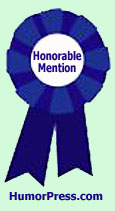My father worried about my future. He kept asking me if I knew where I was going. “What profession will surrender to your wit?”
An old trick used by fathers in his generation was to hand a boy a tool like a paintbrush or a shovel and see what he’d do with it. When I was eight Dad handed me a hammer. “Carpentry is a fine profession,” he told me.
But I had heard there was gold inside rocks. It took me all day to take that hammer and break up every rock in the back yard. I was starting in on the foundation of the house when Dad, although commending my zeal, took back the hammer. “Not carpentry,” he said.
Next, Dad handed me a shovel to see what I would do. I promptly set out to undermine the house. Encouraged by my demonstration of talent for civil engineering, he hustled down to the library and got me some books on tunnel digging.
“Son,” he prophesied, “one of these days they’re going to dig a tunnel under the English Channel, and you could be just the little digger to do it.”
This dream failed when I ran into the tunnel digger’s eternal problem — what to do with all the dirt you dig out. A moment’s thought presented the usual solution. I would dig another hole. This is what drives tunnel diggers mad.
Next Dad noted my fascination with games involving numbers — games like pool, which is played with numbered balls, and poker, which is played with numbered cards. Oho! Perhaps my future lay in the pure science of numbers. Numerology was hot in those days. You could figure out anything with numbers, even the future.
“That’s it,” he enthused. “You’re a born bookkeeper!”
He taught me how columns of figures added up in terrible logic to The Bottom Line. He told me stories about the high drama of bookkeeping. It seems an embezzler got caught with his books $310,000 short. “Where are your substantiating documents?” the police asked him. When he couldn’t produce any receipts, it was sayonara, baby. Cops love to ask for substantiating documents. They nail everybody with that one.
The problem was I never could see the use of Dad’s instruction. What I wanted to know was, where he got all those figures he was teaching me to add up.
“Oh, that’s another story,” he said. “Now you’re talking about paper trails, which is accounting. You don’t want to know all that.”
I knew one thing — I didn’t want anything to do with a profession that required substantiating documents every time you turned around. If Dad had seen those love notes I stuffed in Jean West’s inkwell he would have known I was no bookkeeper and my talent lay in writing flaming prose.
Years later, raising a family, I finally saw the reason for bookkeeping. It is used to find out where the money went.
Today, I know how embezzlers get started. First they get impatient with documenting everything. They devise a scheme to eliminate those troublesome documents, so they can engage in dynamic executive action.
But eventually all that dynamic executive action comes under the auditor’s eye. The first thing auditors always do is start rummaging around looking for those blasted substantiating documents. It is just maddening!
Years later when my first wife overdrew our checking account, I leaped into action to demonstrate my profound knowledge of bookkeeping.
“Listen, Bubblehead,” I snapped, “according to my infallible system of checks and balances, we had plenty of money in the bank. What happened to it?”
“Household expenses,” she replied airily.
I gave her my best Perry Mason smile and thundered out the killer question: “Where are your substantiating documents?” I sat back and waited for her to collapse and admit everything.
“I don’t need any documents, Mr. Accountant,” she replied, “so you can just take that infallible system of yours and stick it up your nose.”
This sweet reason led me away from a life devoted to numbers and into the slothful life of writing, where I don’t always have to be rummaging around looking for a bunch of substantiating documents.
Hah! If I need any documents I just write ‘em up.
